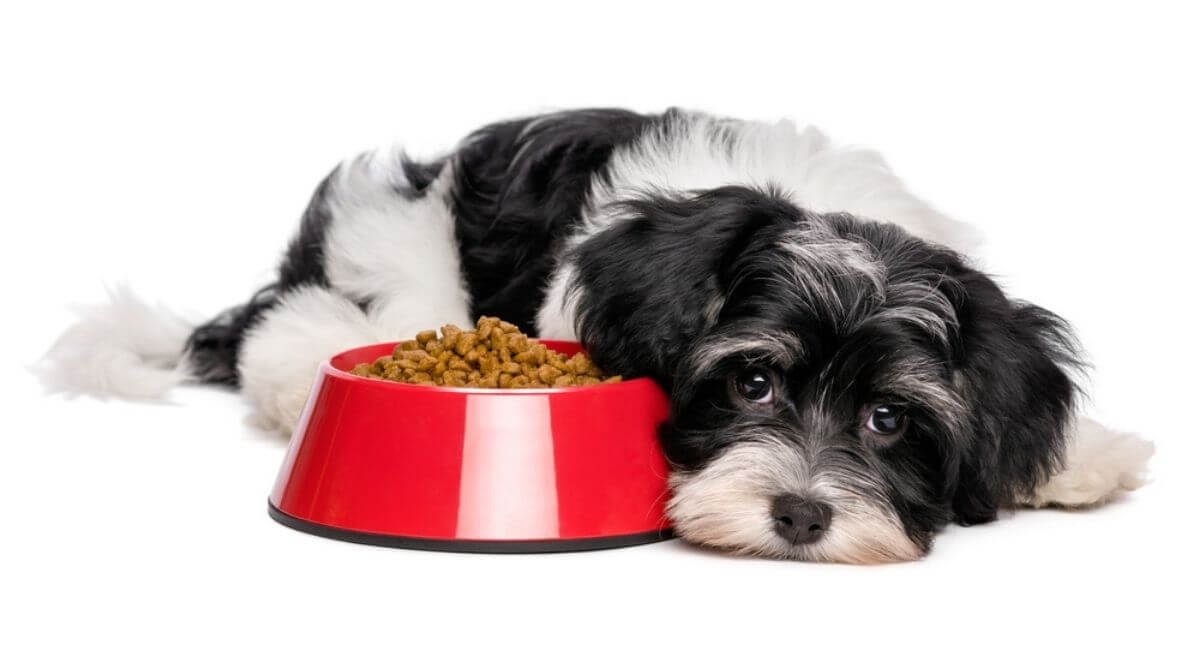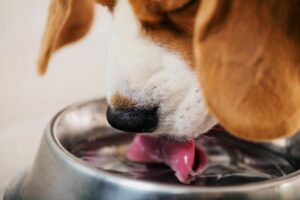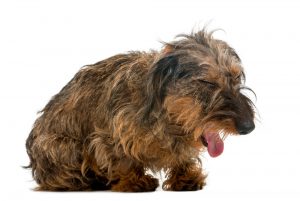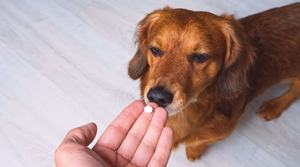Puppies are, for the most part, a bundle of energy when they are awake, and so any pet parent would expect that their puppy would have a voracious appetite, especially given all the calories they must be burning with all that playing, running and exploring. So if a puppy suddenly won't eat, it's naturally very worrying. It's even more distressing for pet parents if they cannot figure out why.
There are a number of reasons that your puppy might stop eating, including disliking the food they are being offered (dogs have preferences too), being too hot or cold, suffering from one of a variety of health problems or simply being a rather picky eater (they are babies after all.)
Are you right to be worried if your puppy won't eat? While you don't need to go into full scale panic, it is important that puppies eat enough, and eat it often enough. Puppies, unlike their adult counterparts, do not have the reserves of fat their bodies can tap for extra energy if they don't eat, so while missing a meal or two likely won't hurt, any more than that could quickly become a problem.
Why Won't My Puppy Eat His Food?
While there are all kinds of reasons why puppies stop eating, and you should always err on the side of caution and be prepared to call your vet right away if they seem ill or listless, here's a look at some of the most common reasons your fur baby might turn down their chance to enjoy a tasty meal.
1. Your Puppy is a Picky Eater
Puppies are the canine version of a toddler, so, like them, it's not that unusual for a puppy to be, or become, a rather picky eater.
If your puppy's veterinarian has given them a clean bill of health, see if they're willing to eat anything other than their meals, such as nutritious dog treats or dog-safe fruit. If they seem to enjoy particular foods, it's possible that they're becoming finicky with their normal meals. There are a few alternatives available to you here:
Switch Their Puppy Food, But Carefully
You wouldn't want to be compelled to eat anything you dislike on a daily basis. It's sometimes as simple as changing the texture or firmness of the food you are offering to your puppy. Changing the protein source (chicken, beef, etc.) isn't recommended unless your dog has been diagnosed with a food allergy, according to experts.
Why? Changing your dog's protein sources can make it more difficult in the future if he develops dietary sensitivities or allergies. This is one of the reasons why, instead of limited ingredient or new protein diets, when pets develop food allergies, it is advised that they be fed veterinary hypoallergenic diets (which are significantly more expensive).
Even if you're switching, stick with the same protein and modify your puppy's diet gradually over time to avoid stomach problems.
Make Your Puppy's Current Food More Appealing
Dry food - which is what the majority of vets recommend that puppies primarily be fed, is not exciting, and some puppies are simply not excited by their food. Or, to be more specific, its smell does not excite them. As there are a thousand other things to distract their attention in their exciting new world, this may mean that they just aren't interested enough to eat.
If this seems to be the case, you can try adding a more appealing topper to their meals. Wetting the food with warm water and allowing it to sit for a few minutes can make it more appealing (read: nicely stinky) to your dog. Do this before giving your puppy the food and see if this helps before you actually change the food itself.
Pro Tip: For more inspiration on how to make dog food appetizing read "How To Make Dog Food More Appealing".
2. Stress and Anxiety
Stress can cause a sudden loss of appetite in puppies, and there can be a number of sources of stress that can affect even the happiest of puppies.
If they are newly arrived in your home, the change in their surroundings can be unsettling, and if they are used to people being at home, and then they go to work or school and are no longer available for constant pets and praise - which is the case for many pet parents returning to their usual routines after various lockdowns - this can be stress and anxiety causing too.
Other household members may occasionally add to a puppy's stress too - an unfriendly cat, an overzealous toddler - and cause them to temporarily lose their appetite too.
3. Dental Issues
One of the less pleasant stages of puppy growth - for them - is teething. Puppies begin to lose their puppy teeth at between four and six months of age. The process, it's believed - is as uncomfortable, and perhaps even as painful, as it is for human babies, and so this will often lead to a puppy not eating as a result.
4. Other Health Issues
Sometimes not eating is a sign of an underlying illness, and that is when a visit to the vet is called for as a matter of urgency, even if the issue turns out to be something fairly minor.
A loss of appetite caused by illness or injury is very hard for a pet parent to diagnose alone, as it can be a symptom of all kinds of health problems, including any of the following:
- Digestive upset, such as constipation
- Respiratory infections such as kennel cough
- Canine cold or flue
- Ingestion of a foreign object (puppies will eat all kinds of bad things given the chance)
Rather than trying to guess if your pup's loss of appetite is due to a problem with their health, ask their vet. If it is, the issue can be treated promptly.
If they are given a 'clean bill of health' you can move on to some other things you might need to do to return a puppy who won't eat to their usual mealtime habits, something we are going to take a closer look at next.
What To Do If Your Puppy Won't Eat?
If your puppy has visited the vet and there seems to be no medical reason for their loss of appetite, it will be time to try something else to get them to eat. This can be a frustrating process, but stick at it, as your puppy's healthy transition to adulthood really does depend on them getting the right nutrition.
Here are some things you can try.
If Your Puppy Won't Eat Their Dry Dog Food
Most puppies arrive from the breeder or shelter having been raised on a specific type of dry dog food, and the chances are that you will be instructed to keep feeding them the same food.
However, once your puppy smells all the other delicious food in their new home, and maybe even steals a bit of the far more pungent cat food, their taste for this may diminish.
Before making a switch to a different brand, or different flavor, try to make their existing dry dog food more appealing, as switching foods completely often leads to stomach upset. A flavorful topper is often a great solution, and they come in a number of different forms.
One option is a meat based topper. These are often similar to wet dog food, and can add enough extra smell and flavor to make your pup excited about eating his dry dog food again. A gravy can do the same, and there are a number of great dog food gravy options out there too.
Pro Tip: If you're considering making your own gravy, check out our "How To Make Gravy For Dogs Guide".
Do try to look for dog food toppers that are suitable for puppies to avoid digestive issues.
Both are safe for puppy consumption and add extra nutrients as well as appealing smell and flavor.
If Your Puppy is Teething
If your puppy is refusing their food because they are teething, you can, and should, help relieve their misery in the same way as you would for a human child. Try softening their dry dog food with warm water or gravy to make it easier, and less painful to chew.
A teething toy, like the KONG Puppy Teething Stick will be a big help too. There are lots available, and not only will they help relieve discomfort from teething, but some will help train your puppy's developing brain at the same time.
If Your Puppy is Stressed or Anxious
If your puppy seems to not be eating due to stress or anxiety, seeking the source can be helpful, but so can things to help them be calmer, as many sources of stress - such as separation anxiety - are not easy to remedy completely.
A calming enrichment activity such as making use of a lick mat can be very helpful. Spread some soft food on a licking mat and place it in your puppy's crate for them to work on. Make sure to keep an eye on them while they're licking the mats, as they're not meant to be chew toys.
You may also smear their dry food on the licking mat after blending it with some water or food topper to provide them those much-needed calories.
You could also try a calming collar, but again, ensure that it is suitable for a puppy to wear. These collars have calming scents and while they don’t help all puppies, some pet parents find that they are excellent stress and anxiety relievers for their furry young charges, especially if they have to be alone for a while.




